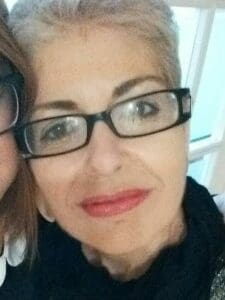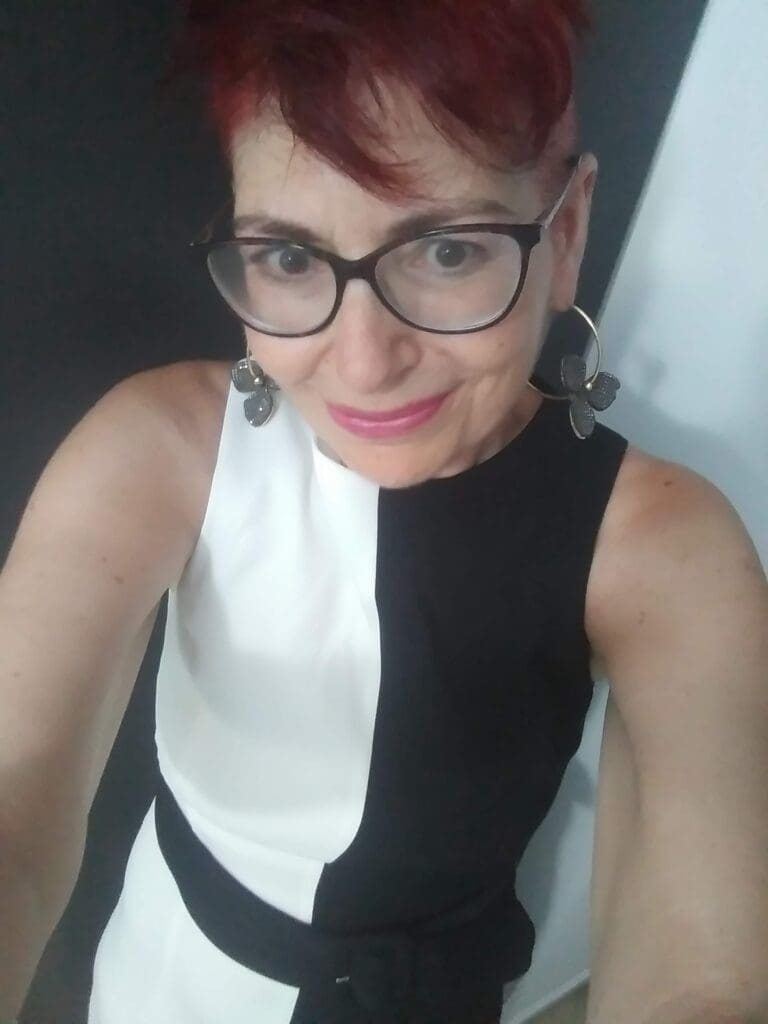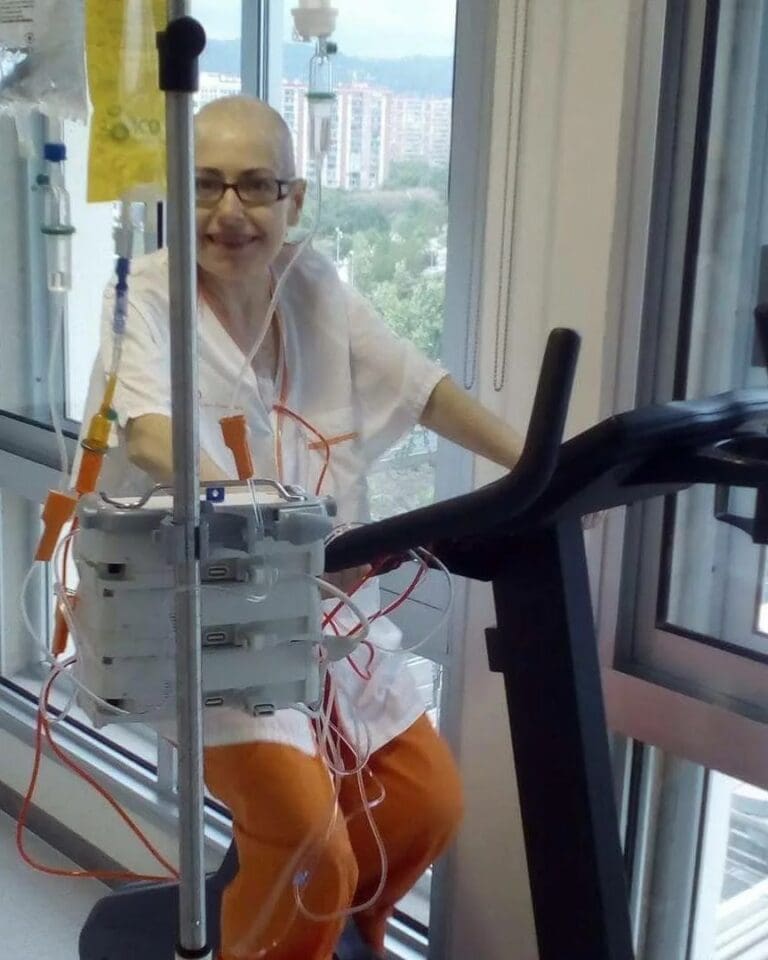
My name is Raquel, and I’m from Barcelona, Spain. Seven years ago, my life took a major turn when I was diagnosed with follicular lymphoma, and this is my story:
It all began with a simple back pain, which made sense for a 45-year-old woman who spent hours running on hard asphalt after ditching her high heels at the end of the working day. I felt hot and started sweating more than usual, but I brushed it off, not thinking it could be anything serious. I was losing weight, but I thought my diet was working and I could finally squeeze back into my old jeans! However, when fatigue engulfed my body, I decided to see a doctor. Blood tests revealed anaemia, which I was told was normal for a vegetarian like me. I started feeling unwell, but I decided to push through because I had a really sick family member as well as a new professional project that was just starting. I felt my body couldn’t afford to fail me at that moment.
That January, I ended up in the emergency room, struggling to breathe. The doctor asked, “Do you know what lymphoma is?” I let out a sigh of relief. I had heard lymphoma typically had a positive prognosis. Cancer, in general, didn’t scare me; my grandfather, mother, a friend, and even the neighbour on the fourth floor had had it and recovered. I, a young athletic woman, believed I would do the same. I had an optimistic outlook. Maybe I’d take this professional break to finally finish that children’s book I started writing ages ago. Or perhaps I’d tackle my great unfinished business: learning English. Oh, and painting could make a comeback too!
Three weeks after the diagnosis, I found myself at the haematology department for the first time. I remained calm, unaware of what lay ahead. Little did I know that from that day onward, everything would change. A young doctor with a melodious voice informed me that I had stage IV grade 3A follicular lymphoma. She showed me a PET scan with the lymphoma spreading throughout my body. At first, my optimism told me she must have gotten the wrong results. That couldn’t be me. Then time stood still as her voice faded away in the distance.

Perhaps it was my partner’s warm green eyes and their tight hold or my daughter’s smile or my son’s wise words. Maybe it was the vibrant city life or the smell of the sea coming into our house, reminding me of a life about to change forever, but it was then that I came to the realisation that time had only stopped for me. Life would continue to move on. I made a promise to myself to cherish every second, embracing happiness while avoiding unnecessary drama. Despite my resolve, loneliness crept in. It was during this time that I sought solace in others facing similar situations on social media.
My treatment involved six cycles of R-CHOP, which granted me complete remission after nine months. I accepted my illness as part of my life, but psychological challenges accompanied the inevitable relapses. Luckily, my new haematologist helped me focus on the positive aspects. With relatively good health overall, I was accepted on a new three-month treatment plan that ran for three months: 24 hours of chemotherapy for five consecutive days, followed by immunotherapy, and an autologous transplant to end it all if the treatment was going well. Yet, despite my time in the hospital, blood transfusions, platelets, and ambulance rides, the disease persisted. I couldn’t believe this was happening to me. The doctors were honest; an autologous transplant was risky, increasing the chances of early relapse given the situation, but they decided it was best to go ahead with it. For once, I allowed myself to experience a bit of drama. I remembered my initial promise, entering the hospital with the best smile I could muster.
It’s interesting how, when looking back, my memories of that first relapse are coloured by the fellow patients and professionals I encountered during those endless days at the hospital. They taught me to live with the disease, transforming dull moments into vibrant ones through art and creativity. I enjoyed eighteen months without the disease, but the second relapse hit me hardest. Feeling extremely sick, I feared that the lymphoma had transformed, but it remained the same. In those moments, my biggest fear was fear itself – that paralysing panic that creeps in when contemplating the future. I learned to live in the present, without dwelling on tomorrow’s uncertainties.

A clinical trial was proposed, but my low platelet counts swiftly led to its rejection. Doctors then turned to a treatment with Obinutuzumab and Bendamustine, followed by an allogeneic transplant. However, budget cuts prevented the approval of funding for Obinutuzumab by the Spanish health system. It felt like they had put a price on my life! I felt desperate and abandoned by society. Sharing my situation on social media brought forth thousands of people rallying behind me, empathising with my plight. I was not alone, and in that moment of desperation, I felt the most supported and loved.
Time was slipping away, and I had to accept another treatment option with Rituximab and Bendamustine, underscoring the lack of enough trials and treatments in Spain. Just when things seemed bleak and the treatment appeared futile, a PET scan revealed an unexpected outcome. The impossible had become possible; I had managed to rid myself of the disease. I wept with emotion, much like I did weeks earlier when a call confirmed a 90% compatible donor: my daughter. In the autumn of 2019, my daughter’s cells travelled through my body, granting me a second chance at life, courtesy of science.
Though I didn’t write a book; my English remains a pending challenge; and that blank canvas I was going to paint awaits the stroke of an immaculate brush. Today, after a coffee in a calm café in a city devoid of the sea’s scent, I touch up my red lipstick, as I had promised a friend I would always do. I look inside and I feel content, despite it all. I discovered a new purpose in life: helping vulnerable people through a charity, while never forgetting the travel companions who one day will wonder what it’s like to live with follicular lymphoma. This is why you’ll find me actively engaging on social media and appearing in the media – to shed light on an invisible disease in our society. As an administrator of the support group “Follicular Lymphoma, United by a Dream,” I’ll tirelessly advocate for more research, more life, equal access to the best treatments, and ensuring no one feels alone.
Lastly, remember to gather countless moments of happiness, and never forget to truly LIVE.